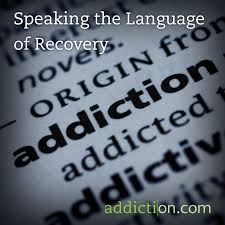NewDay Counseling
If you have a problem with alcohol or some other drug, call a NewDay counselor at 912.201.3605 * 401 Mall Blvd, Ste 101 D, Savannah, Ga * Free Phone Consultations
The Language of Addiction
 By the language of addiction I mean how we talk about addiction in ordinary day to day discussion, how addiction professionals talk about addiction among themselves, how addiction professionals talk about addiction with clients/patients, how medical professionals who don’t specialize in addiction talk about it, etc. Often there’s miscommunication because of the stigma placed on addiction. The term itself is loaded and many professionals who work with addiction prefer to call it chemical dependence rather than addiction. These chemical dependence professionals also avoid the term drug addict or alcoholic — they feel the labels are too judgmental, demeaning and offensive.
By the language of addiction I mean how we talk about addiction in ordinary day to day discussion, how addiction professionals talk about addiction among themselves, how addiction professionals talk about addiction with clients/patients, how medical professionals who don’t specialize in addiction talk about it, etc. Often there’s miscommunication because of the stigma placed on addiction. The term itself is loaded and many professionals who work with addiction prefer to call it chemical dependence rather than addiction. These chemical dependence professionals also avoid the term drug addict or alcoholic — they feel the labels are too judgmental, demeaning and offensive.
I started working in the addiction field in the early 80s, and at that time “drug addict” and “alcoholic” were common terms. Yes, society used these terms in disparaging ways, but, then, society is going to use terms in disparaging ways as long as the stigma and old ideas about addiction exist. I don’t use the term “chemically dependent” often, but I might if I’m communicating to someone or a group of people who understand and use that term. Addiction is a perfectly good word from my perspective.
When I started in the addiction field in an inpatient facility, we called those who came for help “patients”, but now we call them “clients”. I think what matters most is not particular terms but the communication of ideas and facts, the connection on an emotional level and the understanding established on an intellectual level. It’s probably confusing to people, though, outside the addiction professional when they hear different terms used from one place to another. This is why the initial intake and assessment are important when someone seeks help. It’s important that the patient/client is not confused. It’s also important that we don’t soft peddle a serious condition by using vague terminology.
At NewDay, we seek to clarify the treatment experience upfront. We let the client know what to expect and we seek to get a feel for how the client understands the problem. We ask the client what they want out of treatment. It’s best to stay objective, to let a person know what the assessment/evaluation shows. If there are signs and symptoms of addiction/chemical dependence, then we let the person know what we see in the assessment/clinical evaluation. We make observations and recommendations not moral judgments and commandments.
When talking with someone who’s seeking help because alcohol or some other drug has become a problem, I always explain terms like “drug addict” or “alcoholic” or “substance abuse” or “chemical dependence”. I tell the person that if we use these terms, they’re not judgments and not meant to demean — we’re trying to establish the severity of the problem and the appropriate level of treatment.
Once trust is established, it’s like when a family has their own language and ways of communicating with one another when dealing with problems — if someone outside the family talked to the person in the same way, it might be offensive, but inside the family it’s understood. If I talk to a client to whom I’ve established trust, and I use the term “drug addict”, as in “it’s helpful for a recovering drug addict to establish a support system” the client understands what I mean by “drug addict”. If someone outside treatment who doesn’t have a close relationship with the person says “you’re a drug addict”, the person might react defensively. I also use the terms “drug addict” and “alcoholic” in treatment because if they go to Alcoholics Anonymous or Narcotics Anonymous for ongoing support after treatment, they’re definitely going to hear the terms — but, again, the terms are understood in such an environment and no one feels demeaned or insulted.
In treatment, the person who’s seeking help is better off understanding the language of addiction, and understanding that not everyone understands addiction in the same way. The important thing is no matter if we say chemical dependence or addiction, understanding and accepting the reality of the condition is far more important. If a doctor diagnoses someone as a diabetic, what’s important is that the patient understands the reality of being a diabetic and accepts the treatment for diabetes. It’s the same with addiction — getting hung up on terminology is distracting and dangerous.
Recent Comments